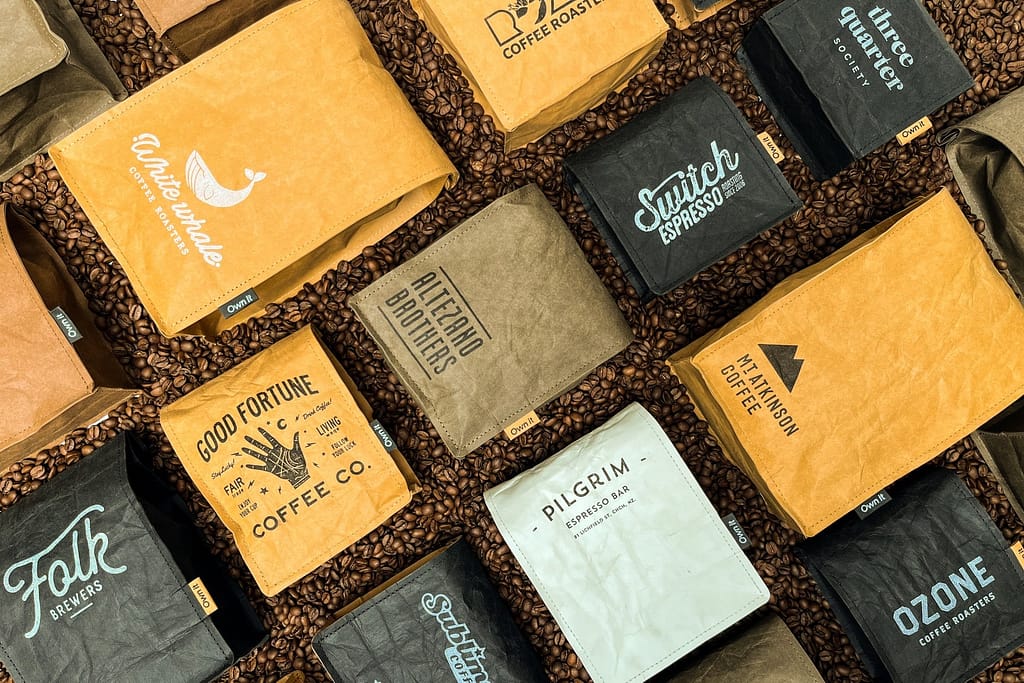[[{“value”:”
SammyBags Co-Founder David Durrant unveils one of the world’s first fully washable and reusable coffee pouches, offering an alternative to single-use packaging.
A chance meeting between Pilgrim Espresso Bar Owner David Durrant and “troubled teen” Sammy Barker has formed a gratifying side project called SammyBags.
“My wife Pieta and children met Sammy down at our local park on the swings. Sammy was in a dark place at the time, and Pieta reached out to her. Our relationship grew from there. As we were toying with the idea of developing reusable bags, it just seemed to make sense that we would invite Sammy to be a part of it,” says David.
David was inspired to create a reusable bag after noticing a regular to his café would always bring her own bag for food she purchased.
“We started with our standard flat bags, but because I have experience making clothes, I quickly realised you could make any type of packaging with the same washable kraft paper, made up of 60 per cent cellulose and 30 per cent synthetic latex. We now have a range of six different hand- made products in multiple sizes, including flat bags, lunch bags, coffee pouches, stand up pouches, everyday grocery bags and sandwich wraps. Our coffee pouches are the most popular in New Zealand,” he says.
“The washable paper is the same material as what the back label panel is made from on a pair of Levi’s jeans. The bags can be washed in a washing machine on any cycle, but the coffee pouches don’t need to be washed at all unless you want to.”
David says while SammyBags seal well, they aren’t airtight. However, he says what might be airtight isn’t necessarily sustainable and what might be convenient may not be reusable.
“Coffee essentially begins to age from the date it’s roasted. From that moment on the quality of the coffee able to be extracted, increases over a few days, peaks, and then decreases. During this time the factors that contribute to protecting the coffee beans are keeping them in a cool, dry, dark, and sealed environment. However, no amount of coolness, dryness, darkness or airtightness will prevent the beans from ageing. The way to improve the quality of the coffee you drink at home is to buy freshly roasted coffee in small amounts more often, what you’d estimate to consume within one or two weeks,” says David.
Customers can choose from 250-gram, 500-gram or one-kilogram coffee pouches.
“Our coffee pouches are designed with the KeepCup model in mind. Customers purchase, own and care for their bags. They’re great for people who place a high value on zero waste and reusable options,” says David.
“They’re convenient because they fold down flat when empty, which is perfect for slipping into your pocket, bag or for cyclists when heading for a top-up back to the roastery. They’re well made, durable, and long lasting.”
David says the product’s life span is estimated to be about five years but could very well exceed that depending on how well a customer looks after it.
“That is a lot of single use waste avoided. We want people to put value in everyday functional items, use them, enjoy them and be proud of how long they last for. The paper softens and ages over time similar to that of leather,” he says.
David says the coffee pouches are stylish and unique, can be customised according to each customer’s needs and are available in four colours.
“The pouches avoid coffee companies putting their names on bags that end up in landfill and also saves money on packaging the more loyal customers use them,” he says.
A portion of the price of every bag sold goes towards supporting mental health in the local community.
“The tag on each bag has the phrase ‘Own it’ which draws parallels between environmental and mental health, encouraging pro-active personal responsibility,” says David.
He says customers who buy the coffee pouches are supporting a small, local, independent business committed to creating products that help move habits towards environmentally friendly outcomes.
“We’re a very small family business plus Sammy and handmake the bags ourselves at home. The largest order we’ve had so far from one business is about 2000 bags, so it’s something that I can keep up with at the moment. Hopefully if we can break into the Australian market, we can start getting some bigger orders and grow while at the same time have a significant impact on reducing waste by providing people with a cool reusable option,” he says.
For more information, visit sammybags.com
This article appears in the February 2024 edition of BeanScene. Subscribe HERE.
“}]]


